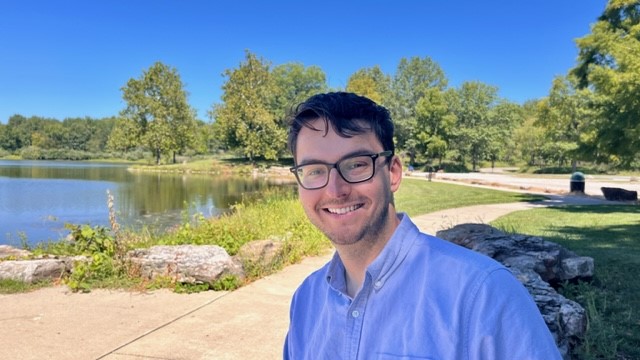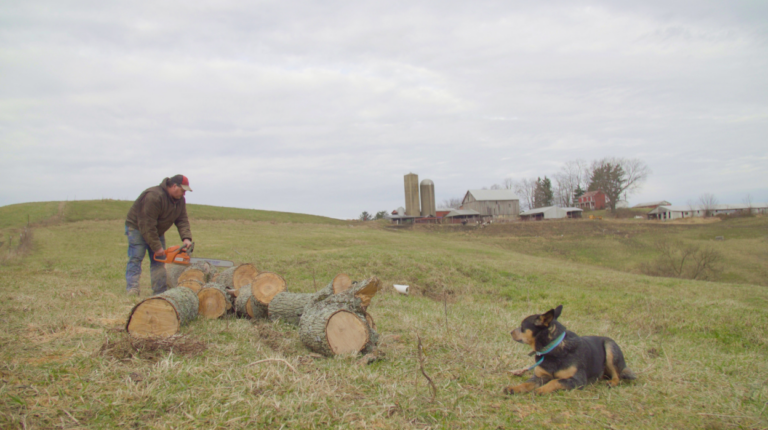If you or someone you know is considering suicide, please know there is help available. Call or text the National Suicide and Crisis Lifeline at 988.
CHAMPAIGN – On Friday, September 15, Illinois Public Media will present the screening of Greener Pastures at the Virginia Theatre in Champaign. The documentary is told through the stories of farmers living at the intersection of globalization, climate change and the mental health crisis.
According to the Centers for Disease Control and Prevention, farmers are among the most likely to take their lives compared with other occupations.
IPM News Director Reginald Hardwick talked with the film’s director Sam Mirpoorian at Homer Lake in rural Champaign County. Below is audio from the conversation, a transcription of the interview and the film’s trailer.

MIRPOORIAN: I spoke to probably over 100 farmers over a six-month discovery period and settled on four farm families that were between Ohio, Wisconsin, Minnesota, Missouri and Iowa. So, I shot with them, filmed with them for five years and they all were directly or indirectly related to suicide, whether they had a suicide attempt, suicide ideation or a family member had died by suicide. And so as, as bleak as that sounds, the film is deeply rooted with legacy and this multigenerational pride of what it means to be a steward of the land.
HARDWICK: Could you tell me one story perhaps that really stuck with you in doing this?
SM: Getting up at 3:45 in the morning to hop in the combine to go harvest when it’s cold dark and being in the combine for 4, 6, 8, 10, 12 hours at a time. Like I just remember like how difficult that was and like how for me, this is just a sample size. Like I’m just doing this for ‘X amount’ of days while these farmers are doing this for all of their lives. And you know, it’s something that they love. It’s like, sure it’s a duty or a chore. But like, they don’t look at it that way and I just had a, a huge revelatory moment where I just realized how important food is and not only that but how important farmers are and like food providers. Because I think as simplistic as it gets, we just go to the grocery store, we grab our items and we go home and we don’t even think about any of the, the processing and how it starts from farm to table and being able to have that experience of just literally seeing it come from the ground. It was just probably the most beautiful thing I’ve ever, I’ve ever endured as a, as a filmmaker and honestly, as a person too, I just, I just really appreciate, and respect and I think they’re incredibly important.
RH: I grew up in a rural area in Colorado. And I know that [there is] loneliness… Is that something that is often an issue in suicides?
SM: Yeah, absolutely. In the beginning when we were trying to fundraise and write like a deck and to pitch it around and stuff, there was a really profound ball state report that said 95% of health care professionals can’t meet their needs in rural communities. So, there’s a strong disparity between, you know, urban and rural communities getting those health care needs that they desperately like, need to, to, you know, to find, you know, their, their, their mental health in a place where it should be. What’s been the biggest challenge are the uncontrollable things where you have to take insurance policies on crops when you have El derecho or you have severe weather, weather patterns, crop prices, you know, the trade war and the tariffs between 2016 and 2020 with the prior administration, climate change, as I just mentioned with weather and also politics… the Farm bill in DC when that gets voted on every so few years. And I just think that culmination of things is what has led to this precipice of this mental health crisis with farmers and agriculture workers. And in the past, they never really had resources to rely on other than themselves. Or as Jeff says in the film, ‘suck it up buttercup.’
RH: Has this film in any way changed how you will go about making documentaries in the future?
SM: We just got really lucky and like, I just will always cherish this, this is my debut feature. So, like, it’s always gonna hold a special place in my heart. I still vividly think about the times and the memories that I have. Whether it was, you know, I would crash with the farmers in their homes because I didn’t have money for lodging. And the times when I needed to decompress after a long day of shooting, I would go to the local YMCA and I would work out in Iowa and Wisconsin and Minnesota. So, I just have a lot of really fond memories and, I also feel like it was a very just coming of age process for myself. I was working on my master’s, I was teaching, making 13 bucks an hour. I was still filming weddings to make supplemental income trying to make this thing happen. And half a decade later, it just feels like an absolute blessing to be here. And it’s an experience I’ll cherish for the rest of my life.
RH: So, you’ve learned about the perseverance in yourself much like the perseverance that farmers have?
SM: Absolutely… if I ever run for president one day, I’m prioritizing agriculture workers, farmers, mental health, health, health care professionals and educators because you have to get taught, healed and fed to have a sustaining democracy and civilization. So, I think they’re the most, one of the most important professions on the face of the planet.

